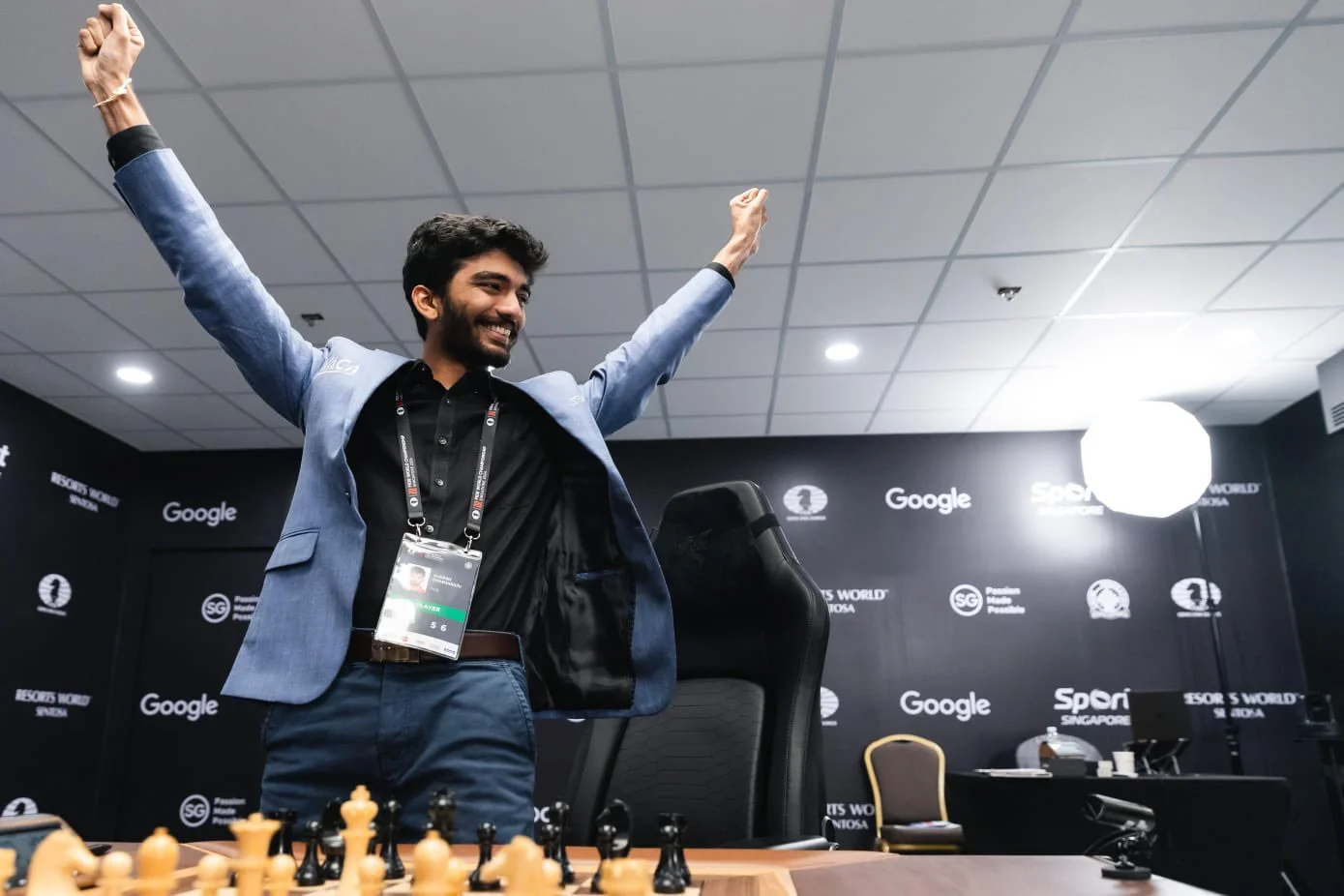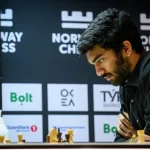D Gukesh made history on Thursday by becoming the youngest chess world champion ever. He defeated Ding Liren in Game 14 of the World Chess Championship 2024 in Singapore. At 18, Gukesh is the first teenager to win the world chess title.

D Gukesh Makes History as the Youngest Ever World Chess Champion
After 13 games, the 2024 World Chess Championship was tied at 6.5-6.5. According to FIDE’s rules, a player needed 7.5 points to win the title. If no one reached that, the Championship would have been decided by tiebreakers.
With both Gukesh and Ding just one point away from victory, the final Game 14 became a crucial showdown. In the World Chess Championship, a win earns 1 point, and a draw gives 0.5 points.

How Gukesh Won The 2024 World Chess Championship
It was an exciting 14-day battle between the reigning champion and Gukesh, with Gukesh finally emerging as the winner.
Game 1: Ding Liren had a tough start playing with black but managed a comeback. Gukesh resigned on the 42nd move, giving Ding a 1-0 lead over the Indian challenger. This was Ding’s first win in 304 days.
Tough loss for Gukesh in Game 1 of FIDE World Championship, presented by Google. #DingGukesh
📷 Eng Chin An pic.twitter.com/XVEyFCV5Mg
— International Chess Federation (@FIDE_chess) November 25, 2024
Game 2: The second round ended in a draw due to a three-fold repetition. Ding continued to lead the World Championship 1.5-0.5 after the second round.
Calm and cool Gukesh after Game 2! #GukeshDing pic.twitter.com/yo00BghawU
— Chess.com – India (@chesscom_in) November 27, 2024
Game 3: Playing with White, Gukesh bounced back from his first-round loss to Ding by winning in the Queen’s Gambit Declined.
Gukesh won Game 3 of the World Championship match without a single one of his pieces ever crossing the halfway line! 🤯 (though if Ding hadn't lost on time the next move would have been the crushing 38.Bxf5!)#DingGukesh pic.twitter.com/SNs1BxQt1d
— chess24 (@chess24com) November 28, 2024
Game 4: A major move happened when Gukesh allowed his Black Queen to be traded for Ding’s White Queen. After 36. Qxd5 Rxd5, both players repeated moves, resulting in a draw. They each earned half a point after 42 moves.
Game 4 ended with the second draw of the World Championship 2024 between Ding and Gukesh: 2-2! https://t.co/vfzYa0mh3w #DingGukesh pic.twitter.com/oyAsjF6ttD
— lichess.org (@lichess) November 29, 2024
Ding and Gukesh finally make a draw by repetition in Game 4 — and pause to reset the pieces! #DingGukesh pic.twitter.com/C2OxjxzaSl
— chess24 (@chess24com) November 29, 2024
Game 5: Ding captured Gukesh’s pawn on f3 and then moved back to c6, leveling the position. The game ended in a draw after both players agreed to a draw following the 40th move.
🇮🇳 Gukesh D ½-½ Ding Liren 🇨🇳
Game 5 of the 2024 FIDE World Championship Match in under 90 seconds! #DingGukesh pic.twitter.com/OWcu6N76ss
— International Chess Federation (@FIDE_chess) November 30, 2024
Game 6: Gukesh initially denied a three-fold repetition but later agreed to a draw after the same repetition occurred.
The Mumbai crowd goes wild after Gukesh rejects Ding’s repetition and plays on Qh4, going for the Win! ❤️
Game 6 of World Championships has always been historic! 🔥
Come on Gukesh! 🙌🏻#GukeshDing #DingGukesh pic.twitter.com/ewFQ9U6lDV
— Rakesh Kulkarni (@itherocky) December 1, 2024
Game 7: Gukesh missed chances, but Ding secured a draw, keeping the score tied at 3.5-3.5.
Gukesh had the advantage, but Ding managed to escape and secure the draw in an exciting Game 7 of the World Championship: 3.5 – 3.5! https://t.co/Mn0w0G9MwU #DingGukesh pic.twitter.com/9VCOyQbLGe
— lichess.org (@lichess) December 3, 2024
Game 8: Gukesh denied a three-fold repetition, but Ding forced a draw in 51 moves.
4-4 between Ding and Gukesh! Both players had their chances today in Game 8 of the World Championship, but in the end it was another draw: https://t.co/iSnQEXg1gA #DingGukesh pic.twitter.com/eE4opCmIdl
— lichess.org (@lichess) December 4, 2024
Game 9: The game ended in a draw after both players removed key pieces from the board.
Gukesh and Ding have just drawn Game 9 of the World Championship: 4.5 to 4.5 before the next rest day tomorrow and 5 more games to play! https://t.co/bCjfeSxNXx #DingGukesh pic.twitter.com/VcfMZUN7O3
— lichess.org (@lichess) December 5, 2024
Game 10: Ding pushed for a risk-free draw, leading to the seventh straight draw after 36 moves.
And Game 10 of the #DingGukesh World Championship ends in another draw! 5-5 between Ding and Gukesh, after 7 draws in a row: pic.twitter.com/LdgOc7fDQl
— lichess.org (@lichess) December 7, 2024
Game 11: Gukesh took a 6-5 lead after Ding blundered on move 28, forcing him to resign.
GUKESH D HAS DEFEATED DING IN GAME 11
🇮🇳 Gukesh 6-5 Ding 🇨🇳 at World Championshipspic.twitter.com/5HrscaEcOV
— The Khel India (@TheKhelIndia) December 8, 2024
Game 12: Ding outplayed Gukesh, forcing a resignation on move 39, tying the score at 6-6.
DING IS BACK IN THE WORLD C'SHIP RACE
Ding beat Gukesh D in Game 12 with White
🇮🇳 Gukesh 6-6 Ding 🇨🇳pic.twitter.com/apXByEuKNh
— The Khel India (@TheKhelIndia) December 9, 2024
Game 13: After 53 moves, a three-fold repetition draw left the score tied at 6.5-6.5.
Applause breaks out after Ding Liren survived a thriller against Gukesh and the scores are still tied going into tomorrow's final classical game! #DingGukesh pic.twitter.com/G5OD1v9flG
— chess24 (@chess24com) December 11, 2024
Game 14: Gukesh, with an extra pawn, kept pushing as Ding misplayed his rook. Gukesh forced a win, and Ding resigned, making Gukesh the youngest World Chess Champion.
Game 14 | FIDE World Championship, presented by Google.
◽️White: Ding Liren 🇨🇳
◾️Black: Gukesh D 🇮🇳
⚔️ Result: 0-1
♟ Match score: 6½ – 7½ (for Gukesh D)
↔️ Game length: 58 moves
📖 Opening: Zukertort Opening
⚙️ Variation: Reversed Grunfeld#DingGukesh pic.twitter.com/nfqKTlPoAG— International Chess Federation (@FIDE_chess) December 12, 2024





























